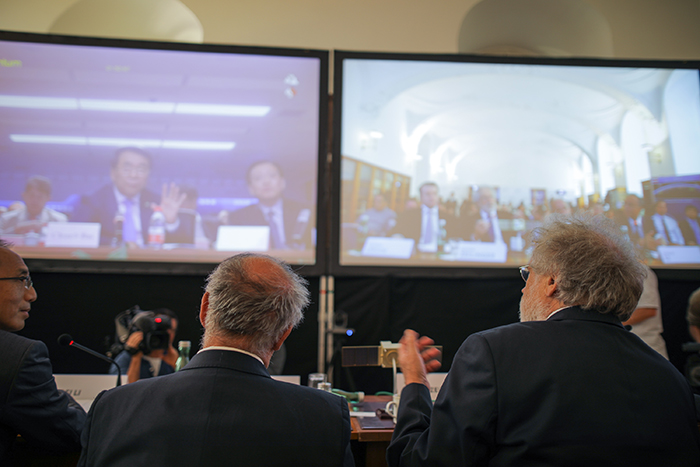A quantum cryptography key has been shared between Beijing and Vienna using a satellite – allowing the presidents of the Chinese Academy of Sciences and Austrian Academy of Sciences to communicate via a secure video link. The call was made earlier today using China's Micius quantum-communications satellite, which was launched in 2016 and orbits about 500 km above Earth.

Quantum key distribution (QKD) uses the laws of quantum mechanics to guarantee complete security when two people exchange information using a secret cryptographic key. The sender and receiver exchange a key made up of a series of quantum states. Quantum mechanics dictates that an eavesdropper is unable to intercept the key without altering those states and thereby revealing the eavesdropper's actions.
Stream of photons
A team led by Jian-Wei Pan of the University of Science and Technology of China had previously shown that a quantum key can be encoded into the polarization states of a string of photons sent from the Micius satellite to a ground station near Beijing. A key was also stored on board Micius for two hours before being sent to a second ground station 2500 km away from Beijing in north-west China. This allowed QKD to be performed between these two ground stations.
The Chinese physicists also teamed up with Anton Zeilinger of the University of Vienna and colleagues to download a quantum key from Micius to a ground station near Vienna.
Now, the Chinese–Austrian collaboration has used Micius to share a QKD key between Beijing and Vienna – which are separated by about 7400 km.
Three keys
The process began with Micius transmitting a quantum key to Vienna so that Micius and Vienna share a key. This is then repeated between Micius and Beijing, creating a second shared quantum key. The two keys are then combined on board Micius and the result is distributed to both ground stations. Using their separate keys and the combined key, both ground stations can then generate a common code.
This morning, such a code was used as the encryption key for a secure video link conversation involving Zelilinger – who is president of the Austrian Academy of Sciences – and his Chinese counterpart Chunli Bai. Zeilinger described the demonstration as "a very important step towards a worldwide and secure quantum internet".
About the author
Hamish Johnston is editor of physicsworld.com
http://physicsworld.com/cws/article/news/2017/sep/29/beijing-and-vienna-have-a-quantum-conversation